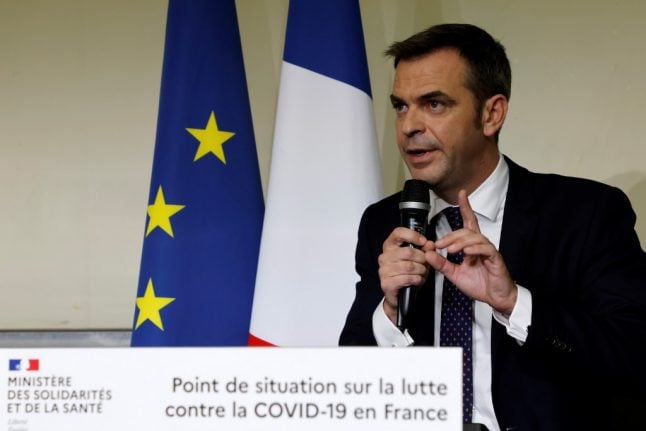The metropole areas of Lille, Lyon, Grenoble and Saint-Etienne have joined Paris and its suburbs and the Aix-Marseille area on maximum alert.
The designation is given to places that have a high number number of cases, a high number of cases among vulnerable people and more than 30 percent of intensive care beds occupied by Covid-19 patients.
The new designations will take place from Saturday morning and will see the closure of all bars in those areas, although restaurants can remain open under strict new conditions.
The bar closure will be for an initial 15 days, although it will only be lifted if the health situation in the area has improved.
Two other areas – Toulouse and Montpellier – were described as “worrying”. Health minister Olivier Véran, in his weekly briefing on Thursday evening, said that if their numbers did not improve in the coming days they faced going onto maximum alert from Monday.
“The health situation in France, alas, is continuing to worsen,” Health Minister Olivier Veran told the nation in a live broadcast on Thursday evening as France recorded another 18,129 Covid-19 infections and 77 ore coronavirus-linked deaths.
“Every day in France, more and more people are being infected, more and more are falling ill, and more and more are suffering serious effects that require hospitalisation.
“The epidemic continues to deteriorate in France, like it does in several European countries.
“When I say that each French person can make a difference, it’s to say that we need to be vigilant at every point during our daily lives,” he said, urging the French population to rigorously respect the government's health rules such as handwashing and social distancing.
The French government is trying to avoid another nationwide lockdown of the type the country saw in March and April, which did major damage to its economy.
Instead it has created a system of local alert levels. Each level carries with it restrictions, from a limit on wedding guests at the lowest level to the closure of bars, gyms and sports centres in places designated 'maximum alert'.
For full details of restrictions for each alert level: France's Covid-19 alert system explained
“For the metroples, Lille, Grenoble, Saint Etienne and Lyon, we have decided to bump them up to maximum alert,” Véran announced.
#COVID19 | Dans les métropoles de Lille, Grenoble, Lyon et Saint-Étienne, les seuils conduisant au passage en zone d’alerte maximale ont été dépassés.
Les mesures de réduction de la circulation du virus correspondant aux zones d’alerte maximale seront déclenchées samedi matin. pic.twitter.com/3DRSam4ExB— Olivier Véran (@olivierveran) October 8, 2020
The designation was expected, and French media had reported on Wednesday that all four areas had breached the thresholds set to declare an area on “maximum alert”. These are; 250 active Covid-19 cases per 100,000 of the population, 100 cases per 100,000 among the elderly and vulnerable population and more than 30 percent of beds in local intensive care units occupied by Covid-19 patients.
#COVID19 | Les seuils conduisant au passage en Zone d’alerte maximale ont été dépassés dans les métropoles de Lille, Grenoble, Lyon et Saint-Etienne. pic.twitter.com/IITSCtfmio
— Ministère des Solidarités et de la Santé (@MinSoliSante) October 8, 2020



 Please whitelist us to continue reading.
Please whitelist us to continue reading.
Member comments